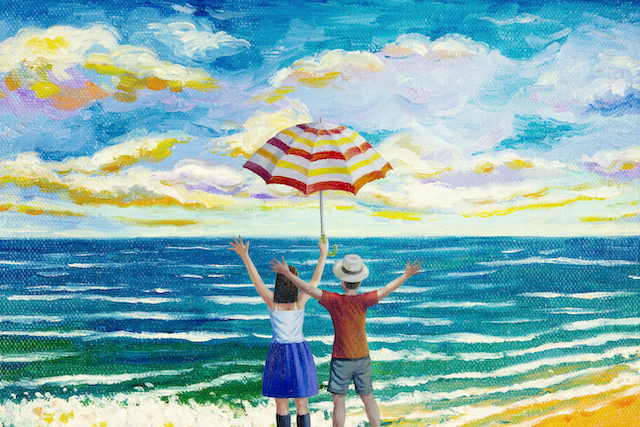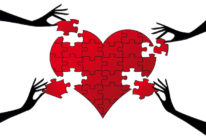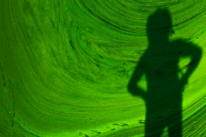
“Nature is the best medicine for serenity. Peace. Calmness. Stillness. It’s good for the heart.” ~Karen Madwell
I was looking for a way to stop obsessing over the future. I’d spent my adult life as an underground musician, and it had been wonderful for the large part. The thing is, it wasn’t good for me anymore.
I felt anxious onstage. I felt really uncomfortable with so many people looking at me. I had changed as a person, and yet I continued putting myself through performing even though I hated it.
Have you ever done that? Have you ever continued to do things that you hate because you identify so strongly with what you are doing? If I wasn’t “a musician,” which I had been all of my adult life, then what would I be? It felt as if I would be nothing at all.
Through dabbling with various new musical projects, I became increasingly aware that whatever was going to be creatively fulfilling (if anything), would inevitably lead my mind to obsess over it, sending me into a dreamworld of scenarios where I was the center of everything. Perhaps this is why I continued singing: I wanted to “be something special.”
In my imagination (which was extremely active), singing always seemed so important, and after each gig I would only remember the fun parts (of which there were many too, don’t get me wrong). Then I’d get onstage the next time and think, “What am I doing here?”
The awareness that I was letting dreams and fantasies dictate my life wasn’t profound, it was just a product of getting a little older and thinking, do I really want to live like this for the rest of my life? I looked into ways that I could enjoy the here and now a bit more; ways of appreciating life as it was actually happening, rather than several years later through filtered, distorted, and romanticized memories.
I’d never meditated or done anything that I would have previously disregarded as “hippy rubbish.” I had read something about mindful breathing somewhere.
I didn’t know anything about mindfulness, but I had an impression that it was something that middle-class people did a lot alongside their yoga. I didn’t relate to that image at all. I didn’t realize that it was simply a tool for paying attention to what is happening.
Then one day I focused on my breath while I was on a walk in the local park with my dog, Euro. Suddenly, everything was alive. The world was just beautiful.
At that moment, focusing only on what I could see and sense, my mind went right back to basics, to where I remember it being when I was a very small child. The hairs stood up on the back of my neck (and all over my body) and I couldn’t stop grinning.
Several blackbirds popped their jerky, judgmental eyes out from under some shrubs, bobbing forward for worms and eyeing me up cautiously as I walked past. I didn’t just see a bird and move on. I saw strange, beaked, winged creatures who fly about this land—singing, to boot! (If birds existed only in myth and folklore, they would make elves and unicorns seem positively dull.)
Walking around the park, I was in a calm ecstasy, grinning at everything around me, occasionally wondering if I looked to others like I was on some serious happy pills (but not much caring what other people thought).
I didn’t see trees and move on. I saw wooden beings, some of them hundreds of years older than me, growing out of the ground and displaying leaves and petals reaching up into the sky. Why we were there together, swapping gases, was a beautiful mystery.
A year or so after this experience, and others like it, I realized that what I was practicing that day was “ecotherapy” or “nature therapy,” although I didn’t know about those terms at the time. I’ve since trained to become an ecotherapist to help other people find this amazing connection to nature, and this is honestly something I would never have seen myself doing five years ago.
Somehow, when I became an adult, I had forgotten what nature meant to me as a child. I think most of us are connected to nature deeply as children, and yet we get easily distracted from it as we get older. I don’t think I am unique in that respect at all.
One day, back when I was seven or eight years of age, I was allowed to set my alarm clock for the early morning hours. I went to the local park with a notebook and pen to see what animals I could find.
I saw my first ever hedgehog, and it felt like meeting a visitor from another dimension. I just couldn’t believe that there was this unique spiky creature in front of me, living completely independently, getting on with its weird little life in shrubs and muck. I still get a feeling of awe when I recall that moment, watching it curl up in the early morning dew.
I grew up as a proper city boy in the suburbs of Liverpool, England. Somehow, when I became a teenager, I did what many of us do and I got so caught up with ‘finding out who I was’ that I neglected what was happening on the earth around me for decades! I had fun for the most part, but I spent so much of my life lost in fantasy and living in honor of some so-called ‘identity’ that I forgot how important nature was to me.
Earth is a wonderland. The diversity of life that we encounter each and every day (and often ignore) is mind-boggling. Creatures that crawl, fly, and speak are everywhere. The vivid colors present in giant plants that grow from tiny seeds is just awesome (in the traditional ‘awe-some’ sense of the word)!
It took me years to comfortably move away from a life in music to be doing the things in life that I am doing now. I think changing our callings in life always comes with a sense of grief to some degree; we attach and identify with the things we do quite naturally.
Nature has taught me to enjoy not being the center of attention, to simply enjoy feeling that I’m a part of this beautiful world, and it’s such a relief! We are tiny and yet we are miraculous at the same time. I don’t need to do things that make me anxious if I have the control to stop doing them.
More About Ecotherapy/Nature Therapy
The term “nature therapy” is used interchangeably with the term “ecotherapy,” but they are referring to the same thing. In a nutshell, ecotherapy refers to therapies and activities that deliberately aim to improve our mental health and well-being through connecting with nature. It is a broad, umbrella term.
Some ecotherapists may be qualified psychotherapists who offer “walk and talk” outdoor counseling sessions, whereas others may focus on helping people to create art or poetry inspired by nature. Some ecotherapists run gardening groups, and there are many more approaches still! Ecotherapy is totally, 100% something that you can do for yourself; it’s actually very simple!
For me personally, the most powerful ecotherapy exercises are based on mindfulness (it was this kind of work that changed my life, and so I’m bound to feel like that)! Here are three simple exercises to try that have been amazing for me personally, and I hope that they help you to find a deeper connection to nature.
1. Look toward the new.
Take a walk somewhere you go often and give attention to your regular habits. Notice your walking habits closely: how you often pay attention to the same things in your environment without conscious awareness. Deliberately shift your attention elsewhere every time you notice you notice your attention going to a habitual place. What new things do you notice around you?
2. Use your senses.
Find an outdoor space where you feel comfortable and safe. With your eyes closed, focus on your senses, especially tuning into sounds, smells, and the feeling of the air against your skin. Open your eyes after a few minutes and take in the color and sights all around you. How does it feel? (Please note, if you have any sensory impairments, simply adjust the task to work in the best way for you; this exercise can be effective with whatever senses you use.)
3. Notice nature reclaiming space.
Take a city/town walk where there is lots of concrete and look for the weeds and wildflowers popping up through the pavement and walls. How often can you spot nature appearing through the cracks? How does it feel to notice it?
Nature is not separate from us. We are a part of nature too, and I hope that these simple exercises help you to feel that connection. If all else fails, simply spend a little time outdoors, or even open a window if there are restrictions on you going outside. Just remember to pay attention to what’s going on out there!
About Stephen McCabe
Stephen McCabe is an ecotherapist, storyteller, and Zen Buddhist who is passionate about the power of nature! He runs beautiful online nature groups which incorporate myths and tales at www.naturecourses.info. He also runs the Nature Therapy Online podcast.













 Though I run this site, it is not mine. It's ours. It's not about me. It's about us. Your stories and your wisdom are just as meaningful as mine.
Though I run this site, it is not mine. It's ours. It's not about me. It's about us. Your stories and your wisdom are just as meaningful as mine. 